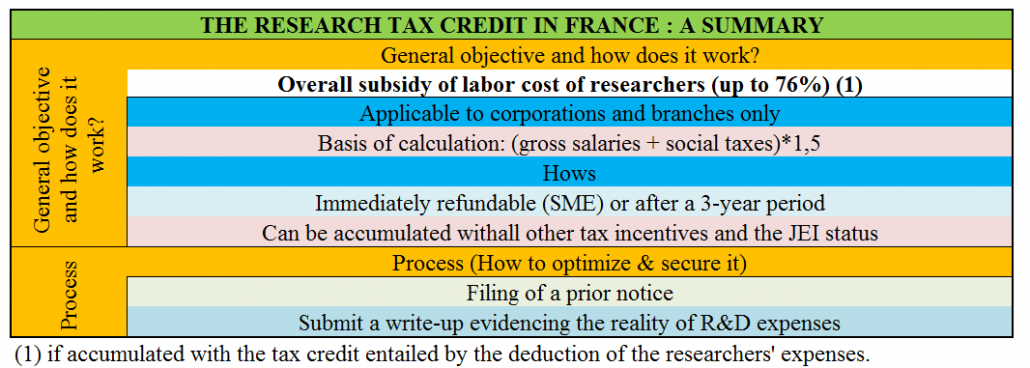Foreign companies : how to profit from the research tax credit in France?
Research tax credit in France – Overview
The research tax credit in France (in French “Crédit d’Impôt Recherche” (C.I.R.)) is a tax measure that enables a partial funding of research, development and experimentation (R&D) for companies; it can be in the form of a reimbursement or a reduction of corporate tax.
International French group branch offices or subsidiary companies can obtain from the French state the reimbursement of up to 30% of their spending on research, experimentation and development operated in France, in the same conditions as French companies. Branch offices are also concerned, that is to say, unincorporated foreign stable establishments in France.
Because the research tax credit in France is a tax measure, it is not subjected to any regulatory framework and is not taken into account for the limit of European public fund aids.
How does it work?
Scope of spending…
The spending engaged has to present non-controllable technical risks and allow an increase of knowledge in the considered technical domain.
…and calculation of research tax credit in France
The spending eligible for CIR are the following:
- Salaries and related social expenses,
- Depreciation allowances for assets used in research projects,
- Operational expenses,
- Intellectual protection expenses (patents costs),
- Technology watch expenses assured by the researchers,
- The costs of subcontracted research entrusted to public research entities, to scientific experts and private structures approved by the Ministry of Research.
The expenses are not capped!
You must substrate all subsidies received from the expenses engaged.
The research tax credit and staff expenses
- Gross salaries and the employers’ social tax costs for researchers (executives and technicians), up to double the amount for young PhD possessors under specific conditions,
- Gross salaries and employers’ social tax costs for managing directors (in French “mandataires sociaux”),
- Salaries of trainees,
- All staff costs not belonging to the company, provided they are charged at cost price, (prorated to the time spent on R&D operations only).
The research tax credit and depreciation allowance
- The depreciation allowance assigned to all R&D operations are included in the base of calcultation.
… And running costs
- Staff expenses as defined above benefits from an increase to a rate of 50%,
- Depreciation allowance benefits from an increase of 75% within operating costs.
… And subcontracted research
- The research expenses entrusted to private organisms are limited up to twice the total amount of other eligible expenses, and capped either (i) to 10 M€ per company provided it is independent on the subcontracter, (ii) to 2 M€ otherwise.
- The listed of authorized subscontracted can be looked up on the Ministry of Research’s Website.
…Intellectual property
- The fees incurred to protect and maintain patents up to 60 000 €.
…and technology watch
- All external outlays up to 60 000 €. Note that staff’s costs are not taken into account.
The research tax credit repayment
The tax credit will reduce corporate tax owed by the company. Any excess is refunded immediately if the company is considered as a SME under the European’s Union definition.
Otherwise, it will have a 3-year carryforward. At the end of 3, years, it becomes refundable in cash.
How to legally optimize and secure the research tax credit (CIR)?
Companies that want to secure their CIR in France can file a prior notice request (rescrit fiscal in French) to the tax authorities before starting research operations. This procedure is highly recommended. The opinion will constitute a position on the part of the tax authorities standpoint, although it keeps its right to control the reality and the amounts of the expenses eligible.
The company has to submit evidence attesting the reality of R&D operations. This submission takes the form of a write-up laid out according to the requirements of the Ministry of Research.
The research tax credit and other taxes incentives
The status can be accumulated with all other tax incentives, especially the CICE, the Video-Game tax credit and the Young Innovative Statut (JEI). For further information on this, please look up tax credits – what you need to know.
Practical effects of the research tax credit in France
Assuming the gross salary of a researcher is 100 € (145 € all social expenses included), the subsidy amounts to (145*1.5)*30%=65.25 €. The research tax credit stands for up to 45% of the overall cost of a researcher.
Accumulated with the tax reduction entailed by the expenses, (145/3)=48 €, the overall tax credit amounts to 65.25+48 = 113 €.
Hence, the residual cost born by the company amounts to 148-113 € = 35 €, that is 24% of the overall costs!
The research tax credit in France : to sum up..

Research tax credit in France
Our firm assists you for the following services:
- Building the procedures to obtain a secure CIR (scientific record, financial record, tax record…),
- Setting up the prior notice request (rescript) if necessary,
- Calculation of CIR,
- Assistance in case of tax authorities claim or control.
Our flexible and lean organization relies on experts and tax lawyers, who master the English language (and in some cases German) and have a confirmed experience of CIR. We assure you a quality of service comparable to that of large consulting firms, but at much lower rates. At Jean-Claude Armand and Partners, we consider that tax advantages should benefit above all the companies. For us, this is fundamentally a question of ethics!
Need more information?


